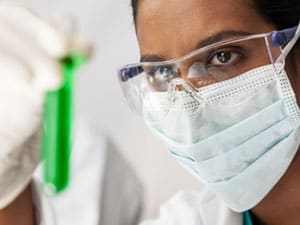18 February 2021
 The contributions of leading Indian research scientists and other stakeholders to the development, funding and advancement of non-animal, human-based technologies were the central focus of a December 2020 BioMed21 roundtable discussion. The event was organized by the Centre for Predictive Human Model Systems, a collaboration between the Atal Incubation Centre at the Centre for Cellular and Molecular Biology and Humane Society International/India. The focus of the CPHMS partnership is on shifting from an observational paradigm to a predictive paradigm for biomedical research and drug discovery.
The contributions of leading Indian research scientists and other stakeholders to the development, funding and advancement of non-animal, human-based technologies were the central focus of a December 2020 BioMed21 roundtable discussion. The event was organized by the Centre for Predictive Human Model Systems, a collaboration between the Atal Incubation Centre at the Centre for Cellular and Molecular Biology and Humane Society International/India. The focus of the CPHMS partnership is on shifting from an observational paradigm to a predictive paradigm for biomedical research and drug discovery.
Dr. Rakesh Mishra, CCMB director, opened the roundtable with remarks emphasizing that innovative technologies based on human biology are no longer aspirational goals for a distant future but ready for implementation in India today. Compared to other preclinical approaches, Dr. Mishra remarked, advanced cell-culture methods and improved genomic understanding can lead to more precise drug discovery programs and better outcomes.
In her presentation, senior CPHMS research associate Dr. Surat Parvatam explained how data generated from human-relevant contexts can be applied to predict biological consequences for drug discovery. The work of CPHMS is centered on three areas: enabling the use of human-relevant methodologies; promoting the use of frameworks that integrate existing data (like the Adverse Outcome Pathways approach of the Organization for Economic Cooperation and Development); and advancing use of computational tools to build predictive models of human biology. Dr. Parvatam identified the lack of dialogue between multidisciplinary stakeholders as one of the main challenges and shared her vision of the roundtable meeting as the first step toward bridging this gap.
The guided discussions that followed the introductory talks concentrated on the need to promote the use of integrative frameworks in India, the lack of context-based algorithms and guidelines to create such frameworks, the need for inter-institutional data managers to collect, standardize, and classify data, and the potential value of publication as a promotional strategy.
A second discussion theme focused on practical mechanisms to support the development of human-relevant technologies in India, including improving the supply chain for bio-industry. It was unanimously agreed that building dedicated Centres of Excellence could provide the necessary infrastructure to develop proof-of-concept and validation for human-centric methods. Participants noted that the involvement of big pharma would be required to ensure continued longer-term investment and sustainability.
After a lively panel discussion concerning investors’ perspectives toward human-based predictive technologies, Dr. Madhusudhana Rao of AIC-CCMB presented concluding remarks, noting that while there was sufficient traction for non-animal methods, much of the work continues to occur in silos.
Recommendations arising from the roundtable encouraged:
- Creation of regional and national Centres of Excellence for developing “proof-of-concept” and validation for human-relevant technologies.
- Development of guidelines and best practices for frameworks to facilitate integration of data, such as Adverse Outcome Pathways.
- Improvement of supply chains for molecular grade reagents, a potentially huge market opportunity for India.
- Embrace of co-funding models involving joint investments by government, pharma companies, philanthropic bodies, and venture funds, to reduce investor risks.
- Cross-sector collaboration to understand how human-relevant technologies can be adopted by industry and translational programs.
- Encouragement of cross-border collaboration to attract global expertise and international funding.
This event made it clear that human-based non-animal research has a promising future in India. There are, however, a number of current challenges to address, including a lack of raw materials, tools, training and requisite funding. These will be necessary if India is to emerge as a key player and innovator in the development and use of these technologies globally.
The meeting was attended by participants from Atal Incubation Centre-CCMB (Hyderabad); Humane Society International/India; Transcell Oncologics; CSIR-CCMB (Hyderabad); DBT-BIRAC; ReaGene Biosciences Pvt. Ltd. (Hyderabad); JNU (Delhi); Endiya Partners; ReaGene Biosciences Pvt. Ltd. (Hyderabad); L V Prasad Eye Institute (Hyderabad); Sapiens Biosciences (Hyderabad); SPPU (Pune); Jubilant life sciences; Oncoseek Bio Pvt Ltd; CSIR-IGIB (Delhi); National Facility for Biopharmaceuticals (Mumbai); CSIR-CIMAP (Lucknow).
Let us know your thoughts on the current challenges facing the development and use of human-relevant methodologies.

Post a comment